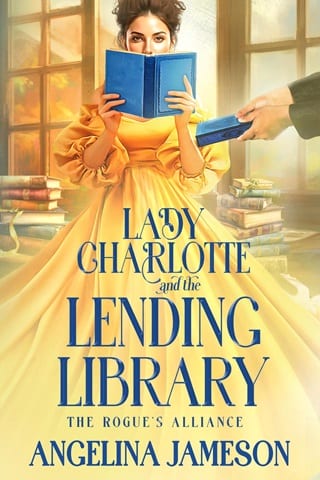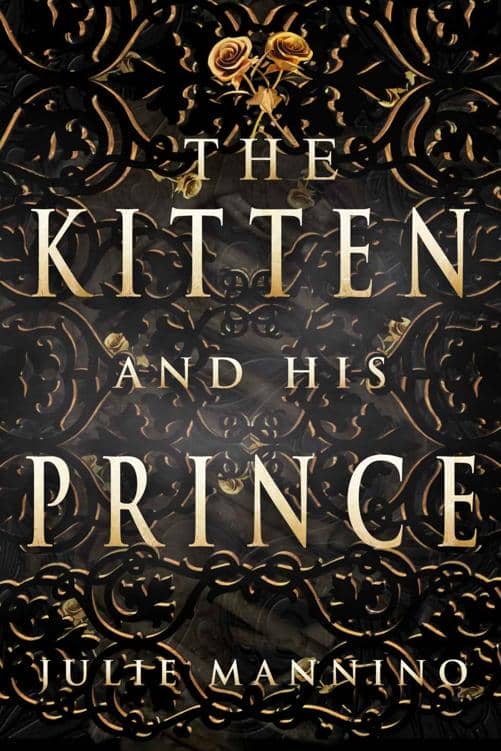Chapter Eight
L ater that day, Charlotte and Louisa joined Edith for tea. They frequently met at Edith’s home as her father was often out, either attending parliament or gambling at his club. Edith’s mother died when she was a young girl, and quite against all convention, her father had raised his daughter instead of sending her to live with either of his sisters or their families. By all appearances, he adored his only child and was content to have her at home with him.
The young women enjoyed a light meal of sandwiches, seed cake, and fruit in the blue parlor of the house. Louisa made several recommendations as to how Edith could update the furnishings and decorations in the room.
“You must speak with my father,” Edith would reply vaguely after every suggestion. “He hasn’t changed a thing in this room since my mother’s passing.”
Charlotte proceeded to recount her conversation with Mr. Colburn from the day before, omitting the discussion she’d overheard between Lord Ashford and the publisher.
She didn’t understand why it mattered that the marquess was worried about the reputation of another woman; it just did. If she told Louisa about Lord Ashford’s interest in Lady Lamb’s book, she wasn’t sure what her friend might say. Louisa would probably think the worst.
Edith studied the list of books from Morgan’s Library. “I believe Thorne’s Lending Library has most of these novels. Now we must convince Mrs. Thorne to set aside a section just for female authors.”
Charlotte nibbled a piece of seed cake as Edith passed the list of books to Louisa to peruse. The cake was dry. She put the remainder of it back on her plate and sampled a lemon biscuit, pleased to find it was moist and delicious.
She recalled an invitation to pay a morning call on the morrow. A readymade opportunity to widen her circle of acquaintances and help Thorne’s had presented itself.
“I’m not going with you,” Louisa declared when Charlotte said she would accept an invitation to call on Lady Sheffield. She added with a curl of her lip, “The lady’s daughter Julia is a brash miss.”
Edith made a tutting noise. “I would be happy to accompany you tomorrow, Charlotte. It will give me an occasion to show Lady Julia I regard her unkindness to me not at all.”
The first time Charlotte and Louisa met Edith was at a ball at the beginning of the season. They stood near two young women, one Lady Julia and the other unknown to them, and happened to overhear a one-sided conversation.
“Lady Edith, you really must engage a new lady’s maid. Your hair is not dressed to complement your bone structure.” Lady Julia sniffed as she shook her head in mock despair. “If only your mother were alive. It is quite obvious you lack a female’s guidance at home.”
The other young woman’s face turned red as she opened and closed her mouth several times without speaking.
Charlotte stepped forward and gently took one of the girl’s arms in her own. “There you are, Lady Edith. Louisa and I have been looking everywhere for you.”
Charlotte spirited the girl away to the supper rooms, and the three women became acquainted over lemonade and cakes. From that night on, Charlotte, Edith, and Louisa had been inseparable. Edith had been chaperoned that evening by one of her aunts, who was not fond of London. After Charlotte’s mother received approval from Edith’s father, she willingly took over chaperone duties for Edith.
“Bravo, Edith!” Charlotte said with a grin, clapping her hands as she returned her attention to the present-day conversation. “There are bound to be other young ladies at the tea, and they can’t all be as unpleasant as Lady Julia.”
Louisa shrugged. “My priority is replacing the curtains at Thorne’s Lending Library. The fabric has been purchased and is currently being fashioned into two sets of window coverings.”
Charlotte took a sip of fragrant tea. She didn’t press Louisa to accompany them on their morning call to Lady Sheffield. Her friend rarely changed her mind once it was made up. Charlotte would be more than happy to use the occasion of the visit to spread the word about Thorne’s Lending Library.
* * * * *
T he evening sun was rapidly giving way to dusk. At nearly eight of the o’clock in the evening, Blandel Bridge in Five Fields wasn’t the safest destination in outer London.
Ashford frowned at his companion. “What are we doing here? We’re in an open carriage in one of the most dangerous areas of Town.”
Cecil drove their conveyance, a phaeton with matched pair, his gaze trained on the road, and approaching stone bridge, ahead. “I needed something light and fast. You didn’t have to accompany me.”
He snorted. “Your invitation was cryptic enough to be intriguing.”
And it had been.
“Tonight, there will be an attempt to sabotage the construction of the first cast-iron crossing over the Thames.”
That crossing would be Regent’s Bridge. After years of controversy and setbacks, the bridge was scheduled to be completed in June of the year.
As they drove to Five Fields, the men discussed Cecil’s newest employee.
“Have you found a task to keep Mr. Bones occupied?” Ashford asked his friend.
“Once I got past the surprise of his showing up on my doorstep, I realized he could be tremendously useful.” The viscount gave a mirthless laugh. “He might know more about the Rogue’s Alliance than I do.”
Ashford was relieved to hear Cecil had given the former smuggler a job. For the foreseeable future, Bones would have funds to find shelter and eat.
Five Fields was a grazing area of reclaimed marshlands, an open valley on the western outskirts of London. The Westbourne River meandered beneath Blandel Bridge, known as “Bloody Bridge,” as it was a known haunt of robbers and cutthroats. The stone crossing was some fourteen feet wide with high walls on each side; the shadows of nearby Boscobel oaks lengthened as the phaeton approached the entrance to the bridge.
The open carriage moved across the expanse, the only sound the clip-clop of horse’s hooves against stone. A bearded figure with a lantern in one hand rose in front of them as the phaeton exited the bridge.
“Who goes there?” a gruff male voice asked.
“Lord Cecil.”
The man lowered his lantern and stepped aside.
“I see your reputation proceeds you,” Ashford said dryly.
Cecil halted the carriage next to the bearded man. “What news have you this evening?”
“A wagon went by just moments ago with several barrels stacked in the bed,” the man replied in a low voice.
The viscount tossed a guinea to the man.
“Brace yourself, Ashford.” Cecil flicked the reins, and the matched pair broke into a gallop.
“What is in the barrels?” he asked over the sound of horses’ hooves pounding against the packed earth beneath them.
“Gunpowder!”
Ashford spied a wagon some fifty yards in front of them. There were two dark figures on the seat. The men wore long cloaks; the driver’s cloak was an unusual light blue color, and both men wore hats pulled down over their ears. The passenger carried a lantern and turned on the seat to look behind him.
Ashford saw movement beside him as Cecil took one hand from the leads he held and pulled a double-barreled flintlock pistol from an inside pocket of his caped greatcoat.
“Will that really be necessary?” he asked, alarmed. Not for the first time, he wondered if he should have accompanied his friend on this errand.
“We can’t let that wagon reach Regent Bridge.”
The bridge was constructed of 78-foot cast-iron arches with stone piers. He imagined the gunpowder wouldn’t completely destroy the nearly finished structure but could make quite a mess of it.
“Hold on!” At Cecil’s words, the passenger seated on the wagon bench faced forward. Cecil raised his pistol and fired a shot into the air.
The team of four horses pulling the wagon shot forward at breakneck speed, the driver shouted at the horses, frantically trying to gain control of his livestock. The wagon careened in front of the phaeton as the passenger threw his lantern aside and looked to be holding on to the bench he sat on for dear life. Cecil drove the phaeton alongside the wagon, forcing the driver to the left onto Kings Road and toward the open fields.
To his right, Ashford glimpsed the road leading to Five Fields chapel, probably the route the wagon was meant to take eastwards to the Thames and on to Regent Bridge.
The horses ahead took a sharp right turn into the fields, the barrels toppling over each other in the wagon. Cecil slowed his team to a canter, taking up a place some distance behind the wagon. As the wagon bounced ahead, several barrels tumbled out of the vehicle. Cecil immediately brought the carriage to an abrupt halt.
The impact of the barrels hitting the ground caused the gunpowder to ignite, resulting in small fires scattered haphazardly across the fallow fields. The passenger of the wagon jumped from the high seat, and the wagon and horses raced away, some ten barrels left in their wake.
Several yards in front of the phaeton lay the passenger from the wagon, his head at an odd angle. Cecil handed the reins to Ashford and jumped down from the carriage. He strode forward and bent low over the man on the ground.
Ashford asked his friend. “Is the man alive?”
In the light of a nearby fire, he could see Cecil searching the man’s cloak. “He’s dead. He broke his neck in the fall.”
“What are you looking for?”
Cecil left the man’s side and retraced his steps. Once back on the seat of the carriage he held up a black object. It was a miniature papier-mache snuffbox, cheaply made, with the letters RA painted on it in white.
“A snuff box?”
“This proves the dead man was part of the Rogues Alliance,” Cecil replied grimly. “We may not have caught the driver, but we have accomplished something this evening: the Home Office will now take the threats seriously and post guards at Regent Bridge.”
The night’s activity had accomplished one more thing: Although Ashford would admit to being restless in recent days, he decided Cecil’s brand of adventure wasn’t what he wanted or needed. Something was missing from his life. He just needed to figure out what it was.
 Fullepub
Fullepub 



